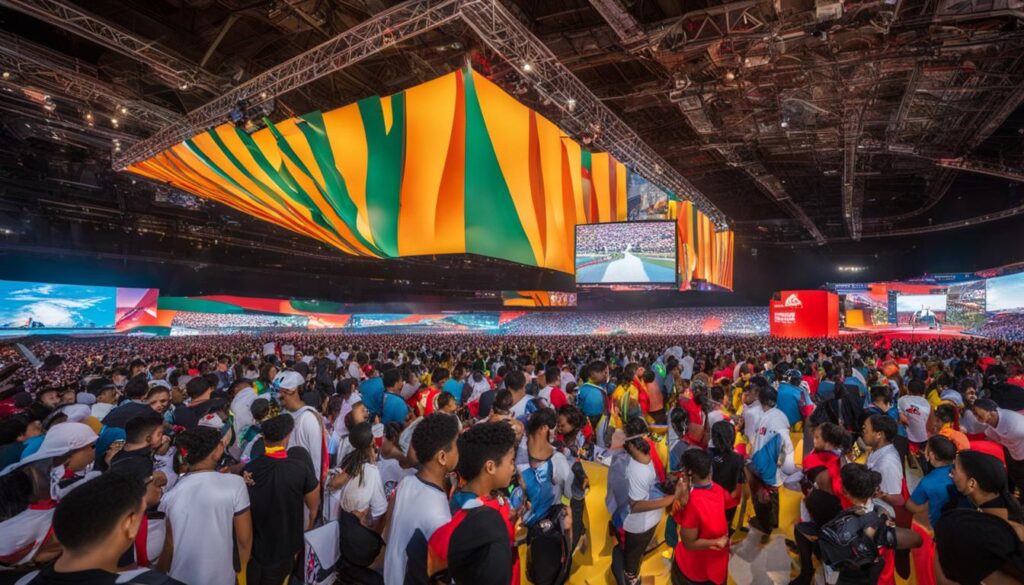In the fast-paced world of business, effective marketing is the heart and soul of every successful company.
As consumer behavior continues to evolve with the advent of digital media, traditional marketing tactics are gradually losing their impact. Businesses are now turning to more innovative and engaging strategies to connect with their target audience.
One such strategy that has gained immense popularity is sports marketing. By tapping into the passion and enthusiasm of sports fans, sports marketing has opened up a whole new realm of opportunities for businesses to promote their goods and services.
In this article, we will delve into the world of sports marketing and explore how it differs from general marketing.
Table of Contents:
- Understanding General Marketing
- Definition and traditional marketing methods
- Historical effectiveness and challenges in the digital era
- The Evolution of Marketing
- Changing consumer behavior and the impact of digital media
- Shift from traditional marketing to personalized approaches
- Uniqueness of Sports Marketing
- Definition and focus on leveraging sports passion
- The live marketing aspect during events and games
- Emotional Connection and Passionate Conversation
- Exploring the emotional connection between sports fans and teams/players
- Eliciting extreme reactions and driving passionate conversations
- Personal Identity and Brand Association
- Attachment of sports fans’ identity to their favorite teams/players
- Influence of athlete or team endorsements on consumer behavior
- Extended Exposure and Fan Loyalty
- Comparing exposure duration in traditional marketing vs. sports marketing
- The impact of brand visibility during sports events on fan loyalty
- Conclusion
Introduction: Sports Marketing vs General Marketing
Marketing has been the lifeblood of businesses for ages, enabling them to reach their target audiences and showcase their products and services. Traditional marketing tactics, such as television ads, billboards, and print media, have played a vital role in shaping consumer behavior and brand perception.
However, the rise of the digital age has brought about a transformation in consumer preferences and media consumption. As a result, traditional marketing methods are facing new challenges, and businesses are seeking more innovative ways to connect with their audiences.
Enter sports marketing – an extraordinary approach that capitalizes on the passion and excitement of sports fans to promote goods and services. By aligning with sports teams, athletes, or sporting events, businesses can tap into the emotional connection between fans and their favorite sports, creating a powerful avenue for brand exposure and engagement.
In the following sections, we will delve deeper into the world of sports marketing and uncover how it sets itself apart from general marketing. Let’s explore the unique characteristics and advantages that make sports marketing a winning strategy in today’s dynamic market.
1: Understanding General Marketing
General marketing has long been the cornerstone of promoting products and services to a wide audience.
Through traditional methods like television ads, billboards, print media, and radio spots, businesses have historically reached out to potential customers.
These tactics have served companies well for years, establishing brand awareness and influencing consumer behavior.
Traditional Marketing Methods
Traditional marketing encompasses various strategies, including print media, television commercials, radio ads, billboards, and direct mail.
These channels provided a direct way to present products or services to a broad audience.
While these methods were effective in the past, their efficacy has gradually diminished with the rise of the digital era.
Challenges in the Digital Era
With the advent of the internet and digital media, consumer behavior has evolved significantly. People now spend more time online, consuming content through social media, search engines, and streaming platforms.
As a result, traditional marketing faces new challenges in capturing the attention of audiences who are increasingly becoming digitally savvy.
The Need for Innovation
As traditional marketing struggles to keep up with evolving consumer preferences, businesses are compelled to seek more innovative and personalized marketing approaches.
To remain relevant in a fast-paced and digitally-driven world, companies must adapt and embrace modern marketing strategies that resonate with their target customers.
While traditional marketing methods still have their place, there is a growing demand for more interactive and engaging ways to connect with consumers.
This shift in consumer behavior has paved the way for the emergence of sports marketing as a dynamic and compelling alternative.
2: The Evolution of Marketing
As the digital revolution continues to reshape consumer behavior, marketing strategies have also undergone a significant evolution.
The shift from traditional marketing to more personalized and interactive approaches has become imperative for businesses to stay competitive in the modern landscape.
Changing Consumer Behavior
The prevalence of smartphones, the rise of social media platforms, and the accessibility of the internet have transformed how consumers interact with brands.
Today, consumers seek authentic experiences, personalized content, and meaningful connections with companies. This evolution in consumer behavior has prompted a fundamental change in marketing strategies.
The Impact of Digital Media
Digital media has become the primary channel for content consumption, giving rise to new marketing avenues.
Social media platforms, such as Facebook, Instagram, Twitter, and YouTube, have become powerful tools for reaching and engaging target audiences.
Additionally, search engines have become an essential component in consumers’ decision-making process, making search engine optimization (SEO) crucial for businesses.
Shift to Personalized Approaches
In response to changing consumer preferences, marketers have shifted their focus from one-size-fits-all advertising to personalized approaches.
Personalization enables businesses to tailor content and recommendations based on individual preferences and behavior. This level of customization fosters a deeper connection between brands and consumers, enhancing brand loyalty.
The Rise of Sports Marketing
Amidst the evolution of marketing, sports marketing has emerged as a dynamic and impactful strategy.
By tapping into the emotional connection between sports fans and their favorite teams or players, businesses can forge genuine and lasting connections.
Sports marketing offers a unique opportunity to engage audiences through live events, passionate conversations, and personal identity associations.
The next section will explore the uniqueness of sports marketing in greater detail, shedding light on how it harnesses the power of sports passion to create unforgettable marketing experiences.
3: Uniqueness of Sports Marketing
Sports marketing stands apart from traditional marketing due to its distinctive focus on leveraging sports passion to promote goods and services.
This unique approach capitalizes on the excitement and enthusiasm generated by sports events, teams, and athletes, creating an unparalleled avenue for engaging with audiences.
Definition and Focus on Leveraging Sports Passion
At its core, sports marketing involves using sports-related content, events, or partnerships to drive brand recognition and loyalty.
- Unlike traditional marketing that relies on broad-based advertising, sports marketing takes advantage of the emotional connection that fans have with their favorite sports.
The Live Marketing Aspect during Events and Games
One of the most remarkable features of sports marketing is its live marketing element. During sporting events, fans are actively engaged in the moment, creating a captive audience for marketers.
Brands can seize this opportunity to implement real-time promotions, interactive experiences, and captivating sponsorships that resonate with the audience.
Engaging Content and Real-Time Adaptation
Sports marketing campaigns thrive on their ability to adapt to real-time events. Whether it’s responding to game outcomes, player performances, or fan reactions, marketers can tailor content on the fly to maintain relevancy.
This dynamic approach allows brands to connect with audiences on a deeper level, fostering a sense of authenticity and immediacy.
Case Study: Nike’s “Just Do It” Campaign
An exemplary illustration of sports marketing’s power is Nike’s iconic “Just Do It” campaign.
By associating their brand with legendary athletes and inspiring sports moments, Nike created an emotional connection with sports enthusiasts worldwide.
The campaign successfully portrayed Nike as more than just a sportswear brand—it became a symbol of motivation, determination, and excellence.
Social Media Amplification
Sports marketing is inherently social, aligning perfectly with the social media-driven era. Fans passionately discuss and share their sports experiences on platforms like Twitter, Instagram, and Facebook.
Brands can leverage these conversations to amplify their message, reaching a broader audience through user-generated content and viral campaigns.
The following section will delve into the emotional connection and passionate conversations that sports marketing evokes among fans, further highlighting its uniqueness in the marketing landscape.
4: Emotional Connection and Passionate Conversation
One of the defining characteristics of sports marketing is its unparalleled ability to foster emotional connections and evoke passionate conversations among sports fans. Sports enthusiasts have an inherent attachment to their favorite teams, athletes, and sporting events, creating a unique environment for marketers to engage with their target audience.
Exploring the Emotional Connection between Sports Fans and Teams/Players
Sports have an extraordinary ability to evoke emotions in fans, ranging from jubilation to heartbreak and everything in between. The shared experiences and sense of community among fans create a deep emotional connection with their chosen sports entities. By aligning with beloved sports teams or athletes, brands can tap into this emotional bond and embed themselves into fans’ lives.
Eliciting Extreme Reactions and Driving Passionate Conversations
Sports marketing campaigns have the power to generate intense reactions among fans. A successful campaign can quickly become viral, sparking passionate conversations across social media platforms, forums, and discussions. In contrast, a poorly received campaign may face backlash from fervent fans. The potential for these extreme reactions sets sports marketing apart from conventional marketing, where responses may be more measured.
Leveraging Real-Time Events for Marketing Impact
One of the strengths of sports marketing is its ability to respond to real-time events during games or sports tournaments. Whether it’s a thrilling victory or a heart-stopping moment, marketers can capitalize on the immediate excitement to engage with fans in the moment. This level of timeliness allows brands to create marketing content that resonates deeply with the emotions of the audience.
Case Study: “The Last Game” by Adidas
Adidas’ “The Last Game” campaign during the 2014 FIFA World Cup is a prime example of how sports marketing can tap into emotions and drive conversations. The animated short film featured renowned footballers transformed into clones to showcase the importance of creativity and individuality in the sport. The campaign sparked fervent debates among football fans, highlighting Adidas’ ability to connect with its audience on a profound level.
Real-Time Engagement through Social Media
Sports events provide an excellent opportunity for brands to engage in real-time conversations with fans through social media. Twitter hashtags, live streaming, and interactive posts allow brands to participate in the buzz surrounding the games and enhance the overall fan experience.
The next section will explore how personal identity plays a significant role in sports marketing, influencing consumer behavior and brand associations.
5: Personal Identity and Brand Association
Sports fans often develop a profound sense of personal identity and emotional attachment to their favorite teams or athletes. This personal connection extends beyond the game and translates into consumer behavior, making sports marketing a powerful tool for brands to align themselves with the values and aspirations of their target audience.
Attachment of Sports Fans’ Identity to Their Favorite Teams/Players
Sports fandom goes beyond mere entertainment; it becomes an integral part of fans’ identities. Supporting a team or athlete reflects their values, beliefs, and sense of belonging. As a result, sports marketing offers a unique opportunity for brands to become an essential part of their consumers’ lives by associating themselves with beloved sports entities.
Influence of Athlete or Team Endorsements on Consumer Behavior
The endorsement of athletes and sports teams by brands can significantly impact consumer behavior. When a favorite athlete endorses a product or service, fans are more inclined to adopt the brand as an extension of their personal identity. The power of athlete endorsements lies in the trust and admiration that fans have for their sports heroes.
Case Study: Michael Jordan and Nike’s “Air Jordan” Line
Perhaps one of the most iconic examples of athlete endorsement is Michael Jordan’s partnership with Nike. The “Air Jordan” line of basketball shoes, endorsed by the legendary basketball player, became a cultural phenomenon. Fans not only saw the shoes as a representation of their favorite player but also as a symbol of excellence and aspiration in the world of sports.
Becoming Part of a Fan’s Life by Association
Sports marketing offers brands a chance to integrate themselves seamlessly into fans’ lives through association with their favorite teams or players. This integration goes beyond traditional advertising; it becomes a part of fans’ daily experiences, building brand loyalty and affinity.
Leveraging Fan Loyalty for Brand Advocacy
Fans are not merely consumers; they are loyal advocates who passionately support their favorite teams and players. By aligning with sports entities that fans hold in high regard, brands can tap into this loyalty and transform fans into enthusiastic brand advocates.
The following section will delve into the extended exposure sports marketing provides and its impact on fan loyalty and brand perception.
6: Extended Exposure and Fan Loyalty
One of the key advantages of sports marketing is the extended exposure it offers brands. Sports events provide a prolonged engagement opportunity, allowing brands to connect with fans over the course of a season or tournament. This continuous visibility fosters a sense of loyalty and familiarity, contributing to a more profound and lasting relationship with consumers.
Comparing Exposure Duration in Traditional Marketing vs. Sports Marketing
In traditional marketing, advertisements often have limited exposure, with TV commercials lasting only a few seconds and billboards viewed briefly during commutes. In contrast, sports events span hours, and fans are exposed to brands through various channels such as stadium signage, team sponsorships, and athlete endorsements. This extended exposure ensures that the brand message remains top-of-mind for a more extended period.
Impact of Brand Visibility During Sports Events on Fan Loyalty
Repeated exposure to a brand during sports events strengthens the brand’s association with positive emotions and experiences related to the sports entity. This heightened visibility creates a positive brand image, enhancing the likelihood of fan loyalty. Fans are more inclined to support brands that share an affiliation with their beloved teams or players.
Leveraging Fan Loyalty for Long-Term Relationships
Fan loyalty is not limited to individual games or seasons; it extends beyond the confines of the sporting event. Brands can leverage this loyalty to establish long-term relationships with consumers. By aligning with sports entities that have a dedicated fan base, brands can tap into this existing trust and create a lasting impact on consumers’ brand preferences.
Case Study: Red Bull and Extreme Sports Sponsorships
Red Bull’s sponsorship of extreme sports events and athletes serves as a compelling case study of how sports marketing can build fan loyalty. By associating with adrenaline-fueled activities, Red Bull has cultivated a loyal following of adventure-seeking fans. The brand’s engagement with extreme sports resonates deeply with its target audience, strengthening brand loyalty and advocacy.
Expanding Beyond Traditional Metrics
Sports marketing transcends traditional marketing metrics such as impressions and click-through rates. Instead, it focuses on fan engagement, emotional resonance, and long-term brand relationships.
Brands can measure success not only by short-term conversions but also by the enduring impact they have on their target audience.
Conclusion: Sports Marketing vs General Marketing
Sports marketing’s unique characteristics set it apart from general marketing, creating opportunities for brands to connect with passionate audiences in innovative ways.
By capitalizing on sports passion, evoking emotions, aligning with personal identity, and embracing extended exposure, sports marketing goes beyond conventional marketing tactics to forge lasting connections with fans.
In today’s rapidly evolving marketing landscape, sports marketing stands as a powerful and influential strategy that resonates with modern consumers.
As businesses seek to engage with their audiences on a deeper level, sports marketing offers an exciting avenue for building meaningful and enduring brand relationships.

Hello! I’m Magnus Berglund, a seasoned trendspotter and proud founder of SportsBizTrends.com.
With over a decade of experience as an independent advisor and consultant, I have specialized in business development and creative marketing within the sports industry. This has, among other things, resulted in a book about sports sponsorship (only available in Swedish for the moment).
If you find my writing interesting, please share it with your colleagues and friends. It would be greatly appreciated!
And yes, I do freelance consulting and provide lectures at industry events, business networks, board meetings, and similar occasions. However, since I also work as a Marketing Manager for an industrial company, I choose the occasions wisely.
That said, don’t hesitate to contact me with your inquiry.
With experience from various assignments in strategy, tactical activations, and valuation of sponsorship (from the grassroots level to the English Premier League), I am happy to share my insights and ideas in this fast-paced industry.
For more information about me and my work, including my contact details, please visit the About page, or connect with me via LinkedIn.








